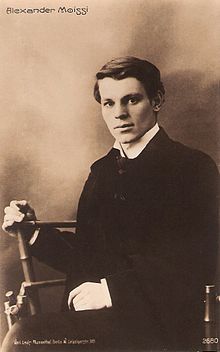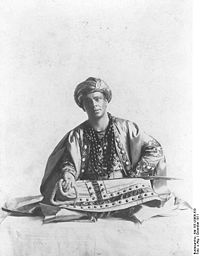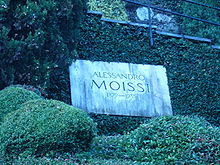- Aleksandër Moisiu
-
Aleksandër Moisiu 
Aleksandër Moisiu, about 1905Born Aleksandër Moisiu
2 April 1879
Trieste, Austria-HungaryDied 23 March 1935 (aged 55)
Lugano, SwitzerlandAleksandër Moisiu (English: Alexander Moissi, Italian: Alessandro Moissi; 2 April 1879 – 23 March 1935) was an Austrian stage actor of Albanian descent.
Early years
He was born in Trieste to Konstantin Moisiu from Kavajë, who was a rich Albanian merchant of oil and wheat and Amalia di Rada, an Arbëreshë, the daughter of a Florentine writer and doctor.
 Moisiu as Prince Kalaf in Gozzi's Turandot, Deutsches Theater, Berlin, December 1911
Moisiu as Prince Kalaf in Gozzi's Turandot, Deutsches Theater, Berlin, December 1911
After an international childhood in Trieste, Durrës and at a Graz boarding school, 20-year-old Aleksandër finally settled with his mother and two sisters in the Austrian capital Vienna. He began vocal studies and applied for a drama training at the k.k. Hofburgtheater, but was rejected due to his strong Italian accent and had to confine himself to mute roles. It was his performance in Molière's Tartuffe of the Burgtheater 1899/1900 season, that stunned the renowned Austrian actor Josef Kainz, playing the leading part. With Kainz' encouragement and support, Moisiu's career as one of great European stage actors of the early-20th century began. The following year took him to the New German Theatre in Prague and in 1903 he joined the ensemble of the Deutsches Theater in Berlin, where he became a protégé of the influential director Max Reinhardt. Together with Rudolph Schildkraut he performed in Reinhardt's staging of Shakespeare's The Merchant of Venice, now emphasizing his melodious speech, which despite first damning reviews finally made him a star.
Moisiu with the Reinhardt ensemble toured Russia in 1911 and was acclaimed in Saint Petersburg by critic and dramatist Anatoly Lunacharsky for his interpretation of Sophocles' Oedipus. Travelling all over Europe and the Americas, his most famous role was Fedya in Tolstoy's The Living Corpse — performed more than 1400 times by him and seen by more than one-and-a-half-million people. In 1914, Moisiu acquired German citizenship to become a volunteer in World War I, and during the German Revolution of 1918–19 joined the Marxist Spartacus League.
In 1920 he played the leading part in the first performance of Hofmannsthal's Jedermann adaption at the Salzburg Festival. However, Moisiu did not keep up with the German Expressionist and epic theatre movement initiated by directors like Erwin Piscator and Bertolt Brecht. He finally left Germany after the Nazi Machtergreifung in 1933 and was offered the Albanian citizenship by King Zog.
Aleksandër Moisiu died of pneumonia on 23 March 1935 in Lugano (other sources claim 22 March 1935 in Vienna) and is buried at the Morcote cemetery overlooking Lake Lugano in Switzerland. According to Stefan Zweig (in his autobiography) he died in the Grand Hotel, Vienna.
Work
His repertoire of leading roles encompassed the whole spectrum of European drama, from Greek tragedy to twentieth century modernism. He was the first in Europe to interpret characters from August Strindberg, Leo Tolstoy, Anton Chekhov, Luigi Pirandello, and Hugo von Hofmannsthal.
In Berlin Moisiu was acclaimed for his 1906 performance of Oswald in Ibsen's Ghosts and in the premiere of Wedekind's Spring Awakening. His interpretations in the leading roles of Hamlet, Œdipus, Faust, Dubedat (in George Bernard Shaw's The Doctor's Dilemma), and many others, were celebrated at the time, as were his voice and emotional range. Beside the Deutsches Theater, Moisiu performed at the Vienna Volkstheater and the Theater in der Josefstadt. Though primarily a stage actor, he also appeared in ten film productions from 1910 to 1935, of which seven were silent, most notably in The Student of Prague by Hanns Heinz Ewers in 1913.
Legacy
Streets are named after Aleksandër Moisiu in Berlin, Salzburg and Vienna, where also a monument was unveiled in 2005.
In Albania he is highly venerated as a most important national actor. In his honour, the drama school of the Academy of Music and Arts in Tirana as well as the university and the city theatre of Durrës were named "Aleksandër Moisiu". The 60th anniversary of his death was remembered in Albania in 1995 with an "Artistic Year" dedicated to him; it was sponsored by the Aleksander Moisiu Foundation in Durrës. The Albanian World War II general Spiro Moisiu and his son Alfred Moisiu, Albanian president from 2002 to 2007, are relatives of Aleksandër Moisiu. On 20 December 2005 in Durrës was founded Aleksander Moisiu University.
Moisiu's daughter by his first marriage, Bettina (born 1923), married the art collector Heinz Berggruen in 1959. Their son Nicolas Berggruen was born in 1961. The German actor Gedeon Burkhard is Moisiu's great-grandson.
Quotes
"The voice and gestures of Moisiu presented us with something hitherto unseen on the European stage." – Franz Kafka
"Hamlet is written for Moissi, and Moissi was uniquely born to interpret the Prince of Denmark." – Max Brod
"I salute Aleksandër Moisiu to whom I am forever grateful, as one of the most brilliant interpreters of my characters." – Luigi Pirandello
"Man of the South, always Man of the South. In order not to be frozen he takes the sun of his country whenever he goes. Whenever you are with him you'll learn something new about life in this world." – Stefan Zweig
External links
Categories:- Austrian stage actors
- German stage actors
- Albanian actors
- Italian stage actors
- Austrian expatriates in Germany
- Austrian people of Albanian descent
- Italian people of Albanian descent
- Italian Austro-Hungarians
- Austro-Hungarian people
- People from Austrian Littoral
- People from Trieste
- 1879 births
- 1935 deaths
Wikimedia Foundation. 2010.

